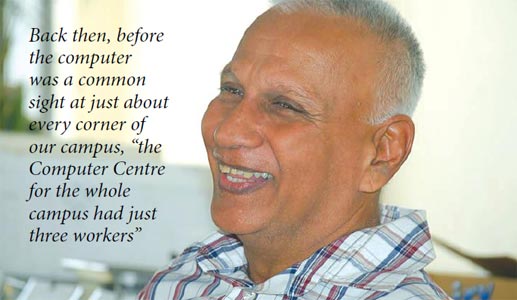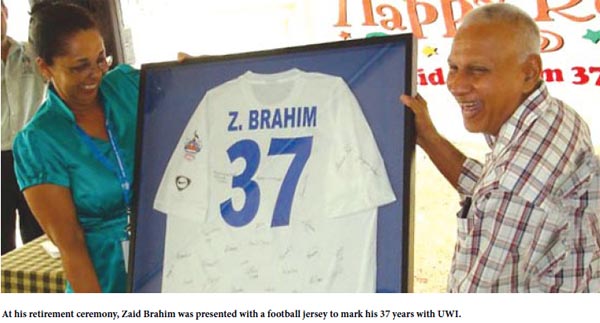 |
 |
 |
|
April 2010
|
He set the computer ball rollingBy Serah Acham Flash forward, March 2010, almost 38 years later. On a day as bright as it was all those years ago, an older, wiser Zaid Brahim sits at the table of honour, surrounded by his colleagues, listening to their fond memories of him, nodding and chuckling every so often as he recalls events of the past. It is a celebration of his retirement and, as the guest of honour, he is showered with accolades and well wishes. When all speakers have had their five minutes of fame, Zaid proceeds to regale them with his own memories as a UWI CITS staff member. Back then, before the computer was a common sight at just about every corner of our campus, “the Computer Centre for the whole campus had just three workers,” he tells, a manager, secretary and the man of the hour himself, Zaid Brahim, the new computer operator, and it was run from just 8am-4pm. Now, the Computer Centre has been transformed into the savvy Campus Information Technology Services, known to The UWI community as CITS, and its staff has grown more than twelve-fold. Yet, despite the vast change in the technology on the campus between 1972 and today, Zaid has maintained his primary purpose at the University, “to satisfy the students.” When he was first hired, at 22 years old, he wasn’t much older than the students he guided through the computer processing of their assignments and he sympathized with them when they succumbed to the pressure of computing systems then. “Long ago students had a hell of a task,” he says. They “would have to key punch (their) own work and it would have to be done in a language, FORTRAN or COBOL or RPG, to actually get the output…nowadays you use the software, which is the programme already built, and you just put in your data, so in those days you had to actually be a programmer to get anything done.” He describes the equipment used then: “key punching machines, the main frame, a card reader, a line printer, all these I will now call heavy duty stuff,” and all apparatus that may be difficult for about half our readership to visualise (it certainly is for me). Eventually, as student needs increased, 24 computers were installed at the centre, but they still weren’t enough, since classes often held 60-100 students.
The room erupts in laughter, and though one can find the humour in the experience now, he admits that “it was serious. They cry and break down and you had to actually go and tell to them ‘look, things will be better tomorrow, go home and take a rest, come back tomorrow with your mind fresh’.” Now, as he sheds his role as Computer Operator at UWI CITS, he still has advice to offer students, though not in the IT arena, but in his other area of expertise: sports and health. “If you can maintain a certain fitness level when you’re young, when you reach a certain age, your five senses will carry you through.” To staff, he also leaves a bit of advice, “try to sweat at least two, three times a week…it’s important…your body is made up like a motor car, if you don’t put water and fuel in it, it will shut down.” He compares the car’s battery to the human heart: “in a car, if the battery is rested for a long time, it will run down. Similarly, if you rest your body for a long time, your heart will die.” An avid football enthusiast, his plans for retirement are clear. “I’ve been playing football for so long, more than 55 years,” he reasons. He will also continue to impart his knowledge and experience, this time to Trinidad’s young footballers as a coach. He has already begun coaching at a football school San Fernando, he says, and hopes to extend his reach to secondary schools in the area. Zaid, we know you’ll teach them well and only hope that they appreciate your presence and guidance as much we did. Good luck and happy retirement! |

 Picture it, early morning, April 1972. A young man walks onto Campus, clean-shaven, sharply-dressed—ready to impress—for his first day of work at the St. Augustine Campus of The University of the West Indies. Today, he will assume his post as the Campus’ first Computer Operator. His future is as bright and promising as the day before him.
Picture it, early morning, April 1972. A young man walks onto Campus, clean-shaven, sharply-dressed—ready to impress—for his first day of work at the St. Augustine Campus of The University of the West Indies. Today, he will assume his post as the Campus’ first Computer Operator. His future is as bright and promising as the day before him. 